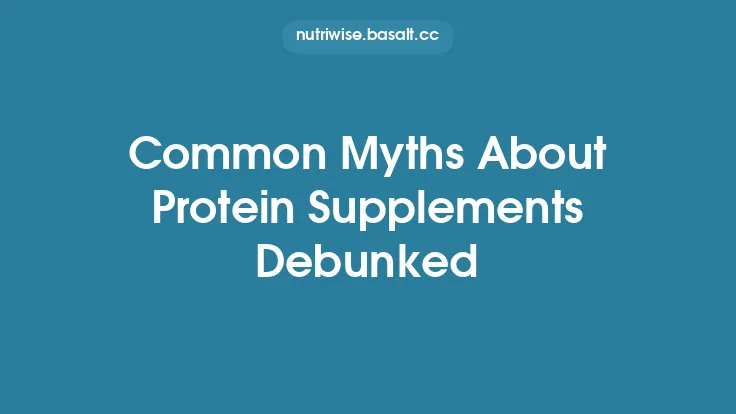Probiotic supplements have surged in popularity over the past decade, promising everything from smoother digestion to stronger immunity. The buzz, however, has also given rise to a host of misconceptions that can mislead consumers, skew expectations, and even jeopardize health. Below, we dissect the most prevalent myths surrounding probiotic supplements, grounding each claim in current scientific understanding while highlighting practical considerations for anyone thinking about adding these products to their regimen.
Myth 1: Probiotics Are a Universal Cure‑All
The claim: “Take a probiotic and you’ll instantly fix any digestive issue, boost your mood, improve skin health, and even prevent chronic diseases.”
Reality: Probiotics are live microorganisms that can confer health benefits, but those benefits are strain‑specific and condition‑specific. A strain that helps reduce antibiotic‑associated diarrhea may have little impact on irritable bowel syndrome (IBS) or eczema. Clinical trials consistently show modest, measurable effects for certain indications—most notably for acute infectious diarrhea, prevention of *Clostridioides difficile* infection in high‑risk patients, and reduction of gastrointestinal side effects from antibiotics. For many other health claims (e.g., weight loss, mood enhancement, skin clarity), evidence remains preliminary, heterogeneous, or absent.
Why it matters: Expecting a single supplement to address a wide array of unrelated health concerns can lead to disappointment and may cause individuals to overlook proven interventions (dietary changes, medical therapies, lifestyle modifications) that are more appropriate for their specific condition.
Myth 2: All Probiotic Supplements Are Essentially the Same
The claim: “If a product says it contains *Lactobacillus or Bifidobacterium*, it will work the same as any other brand.”
Reality: Even within a single genus, different species—and more importantly, different strains—exhibit distinct metabolic capabilities, adhesion properties, and interactions with the host immune system. For example, *Lactobacillus rhamnosus GG (LGG) has been extensively studied for its ability to adhere to intestinal epithelium and modulate immune responses, whereas Lactobacillus casei* Shirota is known for its resilience in acidic environments. The manufacturing process (e.g., freeze‑drying, encapsulation) also influences the viability of the organisms through the gastrointestinal tract.
Why it matters: Selecting a supplement based solely on generic genus labels ignores the nuanced evidence that supports specific strains for particular health outcomes. Consumers should look for products that disclose the exact strain(s) and reference peer‑reviewed studies that back their use.
Myth 3: Probiotics Work Instantly
The claim: “You’ll feel better after the first dose.”
Reality: Colonization and functional integration of probiotic bacteria into the existing gut ecosystem is a gradual process. Most studies assess outcomes after weeks to months of consistent intake. While some individuals may notice a reduction in bloating or gas within a few days—often due to transient modulation of microbial activity—clinical improvements in conditions like IBS or antibiotic‑associated diarrhea typically emerge after 2–4 weeks of regular dosing.
Why it matters: Setting unrealistic expectations can cause premature discontinuation of a supplement before it has a chance to exert its full effect, potentially leading to the false conclusion that probiotics are ineffective.
Myth 4: You Must Take Probiotics Forever
The claim: “If you stop, you’ll lose all the benefits and your gut will revert to a bad state.”
Reality: Probiotic supplementation can temporarily augment the resident microbiota, but many strains do not permanently colonize the gut after cessation. The gut microbiome is dynamic, influenced by diet, medications, stress, and lifestyle. While some benefits (e.g., restored microbial balance after a course of antibiotics) may persist for weeks or months, others may diminish once the supplement is stopped. However, this does not mean the gut will become worse than it was before supplementation; it simply returns to its baseline state.
Why it matters: Understanding that probiotics are a supportive tool rather than a permanent fixture helps users plan appropriate courses of use—such as during periods of dysbiosis (e.g., after antibiotics) or when specific symptoms arise—without feeling compelled to maintain indefinite, potentially unnecessary consumption.
Myth 5: Probiotics Are Only About Gut Health
The claim: “If I’m not having digestive problems, I don’t need a probiotic.”
Reality: The gut microbiome interacts with multiple physiological systems, including the immune, metabolic, neurological, and dermal axes. Certain probiotic strains have demonstrated immunomodulatory effects, such as enhancing the activity of natural killer cells or reducing the incidence of respiratory infections in athletes. Others influence the production of short‑chain fatty acids (SCFAs) that can affect systemic inflammation and metabolic health.
Why it matters: While the primary site of action is the gastrointestinal tract, the downstream effects can be relevant for individuals seeking broader health support—particularly those with compromised immunity, frequent upper‑respiratory infections, or inflammatory skin conditions. Nonetheless, the evidence varies by strain, and claims should be evaluated on a case‑by‑case basis.
Myth 6: Probiotics Have No Side Effects
The claim: “Because they’re ‘good bacteria,’ they’re completely safe for everyone.”
Reality: In healthy adults, probiotics are generally well‑tolerated, with mild, transient side effects such as gas, bloating, or mild abdominal discomfort. However, vulnerable populations—including immunocompromised patients, those with central venous catheters, or individuals with severe underlying illnesses—may be at risk for bacteremia or fungemia from probiotic organisms. Rare case reports document infections caused by *Lactobacillus or Saccharomyces* species in such high‑risk groups.
Why it matters: Clinicians often advise caution or avoidance of probiotic supplementation in patients with compromised immunity or critical illness. Consumers should consult healthcare professionals before initiating probiotics if they have serious medical conditions, are undergoing chemotherapy, or have recently had major surgery.
Myth 7: More CFUs Means Better Efficacy
The claim: “A supplement with 100 billion CFU is automatically superior to one with 10 billion CFU.”
Reality: While a sufficient number of viable organisms is necessary for a probiotic to exert an effect, efficacy is not linearly related to dose. Many clinical trials demonstrate benefit with doses ranging from 1 billion to 10 billion CFU per day, depending on the strain and indication. Excessively high doses may not provide additional benefit and could increase the likelihood of mild gastrointestinal discomfort.
Why it matters: Consumers should focus on evidence‑based dosing for the specific strain and health goal rather than assuming that a higher CFU count guarantees superior results. Product labels that simply tout “high CFU” without specifying strain or supporting research can be misleading.
Myth 8: Probiotic Supplements Are Fully Regulated and Tested for Purity
The claim: “All probiotic products on the market undergo rigorous FDA approval, ensuring they contain exactly what the label says.”
Reality: In most jurisdictions, probiotic supplements are classified as dietary supplements, not drugs. This regulatory category does not require pre‑market approval for safety or efficacy. Manufacturers are responsible for ensuring label accuracy, but the FDA (or equivalent agencies) typically conducts post‑market surveillance and may issue warnings if products are found to be adulterated, contaminated, or mislabeled.
Why it matters: Independent third‑party testing (e.g., USP, NSF, ConsumerLab) can provide additional assurance of potency, purity, and absence of contaminants such as heavy metals or unwanted microorganisms. Consumers seeking high‑quality products should look for these certifications.
Myth 9: Fermented Foods Provide the Same Benefits as Probiotic Supplements
The claim: “If I eat yogurt, kimchi, or sauerkraut, I don’t need a supplement.”
Reality: Fermented foods do contain live microorganisms, but the species and strains present are often undefined and can vary widely based on production methods, storage conditions, and batch-to-batch differences. Moreover, many commercial fermented products undergo pasteurization or have low viable counts by the time they reach the consumer. While these foods contribute to overall dietary diversity and can support a healthy microbiome, they may not deliver the targeted, clinically studied strains that probiotic supplements provide.
Why it matters: For individuals seeking a specific therapeutic effect—such as prevention of antibiotic‑associated diarrhea—relying solely on fermented foods may be insufficient. Conversely, incorporating both fermented foods and a scientifically validated supplement can offer complementary benefits.
Myth 10: Probiotics Can Replace a Healthy Lifestyle
The claim: “If I take a probiotic, I don’t need to worry about diet, exercise, or stress management.”
Reality: The gut microbiome is profoundly shaped by dietary patterns, physical activity, sleep quality, and stress levels. High‑fiber, plant‑rich diets foster microbial diversity, while excessive processed foods, high sugar, and low fiber can promote dysbiosis. Exercise has been shown to increase the abundance of beneficial taxa, and chronic stress can impair gut barrier function. Probiotics can modulate the microbiome, but they cannot counteract the detrimental effects of an unhealthy lifestyle.
Why it matters: Positioning probiotics as a shortcut undermines the importance of holistic health practices. The most robust and sustainable improvements in gut health arise from integrated approaches that combine dietary quality, regular activity, adequate sleep, stress reduction, and, when appropriate, targeted probiotic supplementation.
Myth 11: Probiotics Are Only for Adults
The claim: “Children and the elderly don’t benefit from probiotic supplements.”
Reality: Research indicates that certain probiotic strains can be beneficial across the lifespan. In infants, specific *Bifidobacterium* strains have been used to reduce the risk of necrotizing enterocolitis in preterm babies. In children, probiotics can lessen the duration of acute gastroenteritis and reduce the incidence of atopic dermatitis. In older adults, some strains support immune function and may reduce the frequency of respiratory infections. However, dosing, strain selection, and safety considerations differ by age group.
Why it matters: Age‑appropriate formulations and clinical guidance are essential. Parents and caregivers should consult pediatricians before giving probiotics to infants, and clinicians should evaluate comorbidities before recommending them to seniors.
Myth 12: Probiotic Supplements Can Prevent Weight Gain
The claim: “Taking a probiotic will keep me from gaining weight, regardless of what I eat.”
Reality: While the gut microbiome influences energy harvest and metabolic signaling, the relationship between probiotics and body weight is complex and not fully understood. Some trials suggest modest reductions in body mass index (BMI) with specific strains (e.g., *Lactobacillus gasseri*), but results are inconsistent, and effects are generally small compared to dietary caloric balance and physical activity. No probiotic can offset a chronic excess of calories.
Why it matters: Relying on probiotics as a weight‑management tool can distract from evidence‑based strategies such as balanced nutrition, portion control, and regular exercise.
Myth 13: All Probiotic Supplements Are Safe for Pregnant Women
The claim: “Pregnant women can take any probiotic without concern.”
Reality: Pregnancy induces hormonal and immunological changes that can affect gut microbiota composition. Certain probiotic strains have been studied in pregnant populations and shown to reduce the incidence of gestational diabetes, preeclampsia, and infant atopic dermatitis. However, not all strains have been evaluated for safety in pregnancy, and the quality of the product (purity, absence of contaminants) remains critical.
Why it matters: Pregnant individuals should select probiotic products that have clinical evidence supporting use during pregnancy and preferably carry a medical-grade certification. Consulting an obstetrician before initiating any supplement is advisable.
Myth 14: Probiotic Supplements Are Always Live Organisms
The claim: “Every capsule contains live bacteria that will colonize my gut.”
Reality: Some formulations contain lyophilized (freeze‑dried) bacteria that are revived upon ingestion, while others use spores (e.g., *Bacillus* spp.) that germinate in the intestine. A few products market “heat‑inactivated” or “non‑viable” bacterial components, which can still exert immunomodulatory effects but do not colonize. The distinction matters because viability influences the mechanism of action—live bacteria can compete with pathogens, produce metabolites, and interact directly with the mucosal immune system, whereas non‑viable components act primarily through signaling pathways.
Why it matters: Consumers should verify whether a product claims to contain live cultures and understand that the intended health benefit may depend on that viability. Labels that are vague about the state of the microorganisms can lead to confusion.
Myth 15: Probiotic Supplements Are a One‑Size‑Fits‑All Solution for Antibiotic‑Associated Issues
The claim: “Any probiotic will prevent diarrhea caused by antibiotics.”
Reality: The protective effect against antibiotic‑associated diarrhea (AAD) is strain‑specific and also depends on the type of antibiotic used. For instance, *Saccharomyces boulardii has demonstrated efficacy in preventing AAD caused by broad‑spectrum antibiotics, while certain Lactobacillus strains are more effective against Clostridioides difficile* infection. Moreover, the timing of administration (starting concurrently with the antibiotic) and the duration (continuing for a few days after completion) influence outcomes.
Why it matters: Blanket recommendations can lead to suboptimal protection. When AAD prevention is a goal, selecting a probiotic with documented efficacy for that specific scenario—and following evidence‑based dosing schedules—is essential.
Putting the Pieces Together
Debunking myths does not diminish the genuine value of probiotic supplements; rather, it refines our understanding of when, how, and for whom they are most beneficial. The key take‑aways for consumers and health professionals alike are:
- Evidence matters – Look for peer‑reviewed studies that support the specific strain and health claim you are targeting.
- Context is crucial – Probiotics work best as part of a broader lifestyle that includes a balanced diet, regular activity, and stress management.
- Safety first – Assess individual health status, especially in immunocompromised or pregnant populations, before initiating supplementation.
- Quality over hype – Choose products with third‑party testing, transparent strain identification, and clear manufacturing standards.
- Realistic expectations – Benefits often require consistent use over weeks, and discontinuation will typically return the microbiome to its baseline state rather than cause deterioration.
By navigating beyond the allure of marketing slogans and focusing on scientifically grounded information, individuals can make informed decisions about probiotic supplementation—leveraging its true potential while avoiding the pitfalls of common misconceptions.





